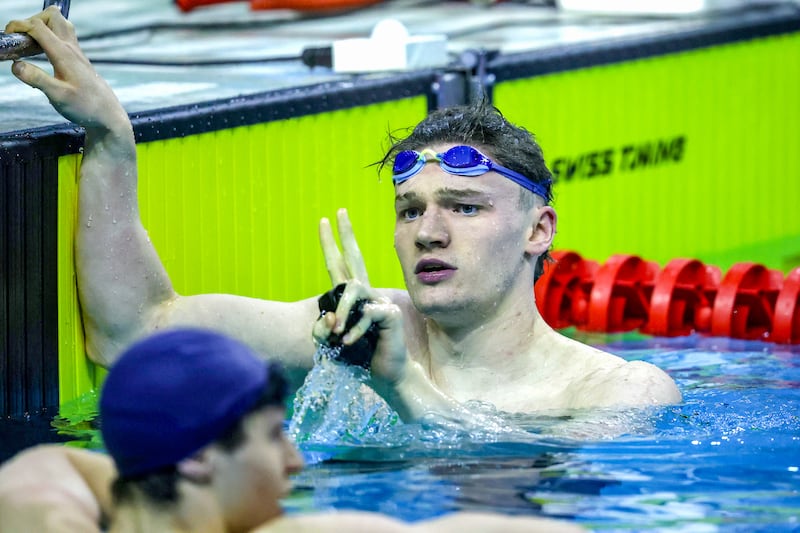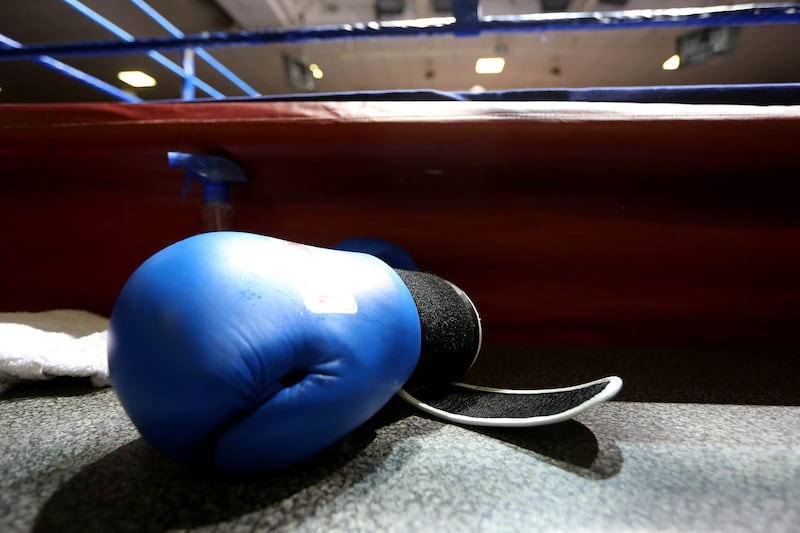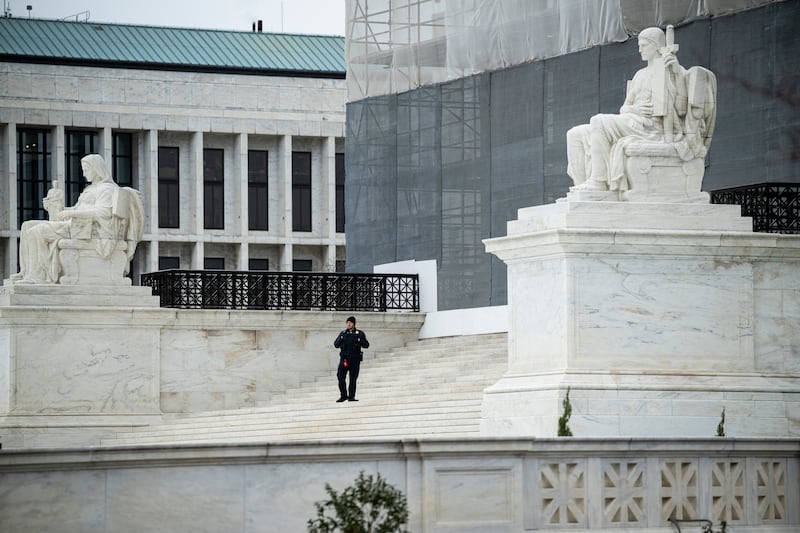In his compact workroom in a stone cottage near where the three counties of Wicklow, Carlow and Wexford meet, Jack Phelan is making magic on a large scale. The video artist and film-maker is creating Six Sides Sawn, an audiovisual show that will be projected on to the walls of Kilkenny Castle next week, as part of the city’s arts festival.
Phelan, who makes moving images for screen and stage, is conjuring a playful riff on the art of illusion for this Light Up the Castle show: he starts by making physical objects, then applies a variety of techniques, from photography to collage to digital.
“I don’t want to make something that feels very digital,” he says. “I want to make something that feels handmade.” He’s not shying away from spectacle but “heading for wow and the crack and a sense of wonder”.
Kilkenny’s 12th-century castle, which sits in the centre of the perfectly formed boutique city, was the seat of the Ormond family for almost 600 years. But let’s not get too bound up with the historical nitty-gritty. Phelan laughs about how “lots of my ideas in history are very visual, like wisps of smoke. It’s a weakness, but I think then it could be a strength. Some in the audience will know a lot about history, will map things on to what they’re seeing; others, with a vague, general sense of history, will enjoy seeing something being conjured.”
RM Block
He created his first audiovisual projection for the castle last year, centred on a craft theme. This time he’s intertwining motifs of magic and castle-building.
“I really wanted to run with this idea of magic, in all its forms, starting with the notion that Kilkenny Castle itself is magic, from the time it was built to today, even with our modern eyes. We tend to see the past as lower-tech, less sophisticated, simpler. But we couldn’t build a castle now. We’ve lost some of the techniques, the magic of castle-building.”
We’re in the studio that Phelan shares with his wife, Erin Hermosa, an artist who works in the film industry; they also work on projects together. It’s full of practical and digital material and tools. There are fabrics, cardstock, bits and bobs of different papers, boxes with rolls of masking and adhesive tapes in various sizes and colours. The studio is tidy and uncluttered – but they’ve a garage in which to store a hoard of artists’ treasure, such as stacks of corkboards.
“You get to a point where you think it’s time to get rid of something, and then either you do and the next day you need it, or you don’t and the next day you use it, and you go, ‘Aha!’ And that reinforces your hoarding instinct.”
There’s a microscope with a camera port that he uses in time-lapse photography, a computer, an animation table with a DIY rostrum camera mounted above. “Every and any type of filming and photography you can do, I’ve probably done a bit of it.”

On the wall are posters for Light Up the Castle and for his animation Mero, which was shown at this year’s Galway Film Fleadh, as well as a colour palette and location impressions for it. Hermosa worked on that, too, including the background art, and crafting sets on paper. “She’s got an unbelievably broad set of skills, from ceramics to traditional sign-painting, graphic design, printmaking.”
On the tall animation table is a large laser-cut jigsaw of a photograph of Kilkenny Castle. “Erin and I made the jigsaw first, as a fun device to build a castle,” says Phelan. This was his starting point. Then he photographed his hands making the jigsaw in a single take, and played with this digitally, adding pieces from a beautiful 14th-century illuminated German manuscript, to “show a year of castle life in medieval times. The idea for the illuminated story only came after the jigsaw was finished.”
Phelan plays this sequence – there are three “chapters” in Light Up the Castle – on the computer. It is magical and beautiful and fun, multiple magician hands building the jigsaw as if it were a card trick.
“My hands being part of this orchestration happening on the castle worked well because it links the audience to the castle. Then you can play with that, with scale and time.”
This segues into a narrative involving noble families, a castle architect, visitors arriving, reading and hunting, “almost like a cliched arc through a medieval fairy-tale-like story of the ups and downs of castle life – feasting, rejoicing, battling”.
Light Up the Castle uses projection mapping to align Phelan’s visual creation with the building’s architecture – and then to tease it. “We’ll project an image of the castle back on to itself to light the castle, but increasing the contrast,” he says. “You get to do all sorts of fun things then, because if you take a piece of that away, it looks like you’ve taken a piece of the castle away. When you’re lighting the castle with [an image of] itself, that lets you play with the architecture in a way you couldn’t if you just lit it with light.”
Projection mapping hadn’t really appealed to Phelan until he did Light Up the Castle last year “and started seeing it as building-sized magic”. He wishes there were a better term than projection mapping, as mapping is just one technique used to create it. “How about moving-image-based architectural interventions?”
Tom Rohan of Eventco is the projection guru behind Light Up the Castle; he and Phelan first worked together years ago when Phelan was part of the core team behind Playhouse, transforming Liberty Hall into a piece of public video art for Dublin Theatre Festival in 2009.
All Phelan’s work involves making moving images. “Sometimes it’s live action, video or film, sometimes it’s motion graphics, sometimes it’s animation, sometimes something in between.” He does most of this moving-image work for theatre. “From my point of view, I’m a film-maker that happens to be mostly producing work for the stage.”
He has worked with theatre directors including Annie Ryan and Annabelle Comyn, and with the writer and director Enda Walsh, including on The Second Violinist and The First Child, his operas with Donnacha Dennehy. He worked with Dead Centre on To Be a Machine, an adaptation of Mark O’Connell’s book into a live-audience-upload experience – “a perfect piece for the pandemic. The theme was transhumanism and what it means to be human in an age of AI.”
After Kilkenny he’s working on Walsh’s Safe House, a song cycle composed by Anna Mullarkey that will be on the Abbey’s Peacock stage for Dublin Theatre Festival.

Light Up the Castle’s Six Sides Sawn subtitle comes from stonemasonry, “when a block of stone is to be prepared on all six sides, shaped into a block” before use. The jigsaw medieval yarn is just the first chapter or sequence. The second picks up on the castle’s riverside location, and a time when water was key for transport. It plays with the castle projection abstractly, impressionistically. “It’ll feel like it’s made of liquid, very fluid.”
For the final section, a “live moment”, there’ll be an attempt at an illusion, using theatre skills and something that can’t be tested beforehand. Phelan swears me to secrecy, but the music is “a little bit dancey”, and “I’m going for a gasp”.
Last year 800 people watched the show in the castle grounds each night. “It has to be dark. It’s quite late. People are maybe staying around town longer. There’s a bit of anticipation.” Other artists will have finished their Kilkenny Arts Festival shows, “so it’s a nice chance to show them something that might inspire them or entertain them after a long day of doing their own shows. There’s almost a mini festival-club feel to it too. It’s lovely.”
For Phelan it has been “fun and liberating to work on a large-scale project like this, without a source text and just a loose starting point. It’s a rare opportunity to fall into the artistic process and trust that each step will conjure the next.”
Light Up the Castle: Six Sides Sawn runs at Kilkenny Castle Rose Garden from Wednesday, August 14th, to Saturday, August 17th, at 10.40pm each night, as part of Kilkenny Arts Festival. Gates open at 10.15pm; the show is free and unticketed






















